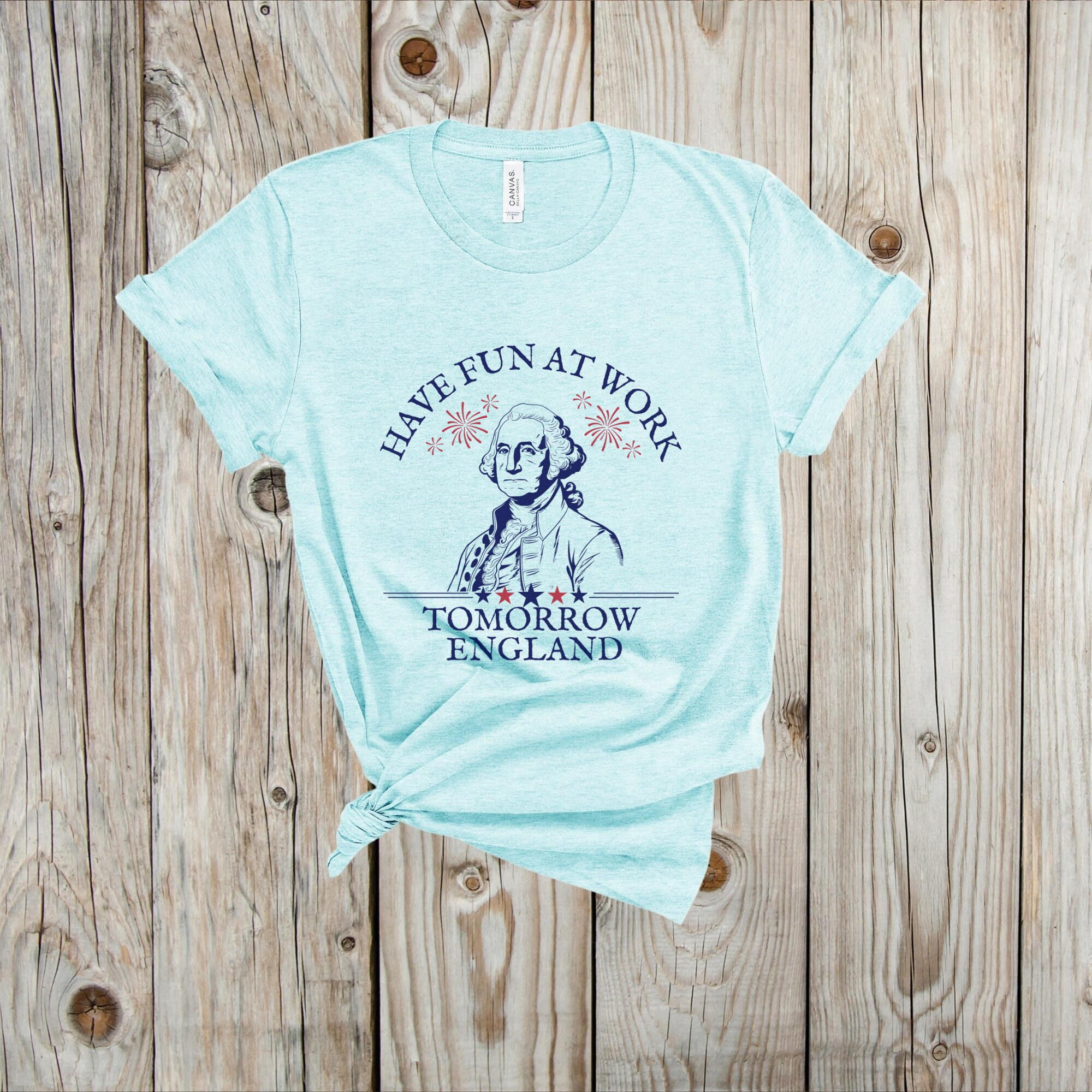Have Fun At Work.tomorrow England
The internet, you know, has a truly special way of bringing people together, sometimes through the most unexpected bits of humor. It’s a place where a simple phrase, like "have fun at work tomorrow, England," can really spark a whole wave of shared smiles and knowing nods across different parts of the world. This particular saying, you see, captures a rather lighthearted moment of cultural comparison, often popping up around a certain summer holiday in one specific country.
It’s kind of interesting, how a phrase like this gets its start and then spreads, isn't it? It usually begins with a bit of a chuckle, a friendly poke, or just a little observation about how different places mark their calendars. This particular saying, for instance, really plays on the idea of a day off for some folks, while others, apparently, are still getting ready for their usual daily grind. It's all in good fun, of course, a way to share a laugh about the small differences that make up our global community.
So, we're going to take a closer look at this popular saying, exploring its beginnings, how it gets passed around online, and what it might actually mean for people who see it. We’ll also consider the bigger picture of finding enjoyment in your daily tasks, no matter where you are or what the calendar says. It’s all about appreciating the light side of things, and maybe, just maybe, finding ways to make your own workday a bit more pleasant, even if it’s not a public holiday.
Table of Contents
- What's the Big Deal About Have Fun at Work Tomorrow, England?
- Where Did This Idea of Have Fun at Work Tomorrow, England Come From?
- How Do People Share the Have Fun at Work Tomorrow, England Joke?
- Is There a Real Meaning Behind Have Fun at Work Tomorrow, England?
- What About Finding Joy in Your Day-to-Day Work, Even if it's Not a Holiday for Have Fun at Work Tomorrow, England?
- How Can You Actually Have Fun at Work Tomorrow, England?
- Does This Meme Mean Anything for Have Fun at Work Tomorrow, England Beyond a Laugh?
- The Lasting Impression of Have Fun at Work Tomorrow, England
What's the Big Deal About Have Fun at Work Tomorrow, England?
You might be wondering, actually, why this specific phrase, "have fun at work tomorrow, England," has caught on so much. Well, it's pretty simple, when you think about it. It usually pops up around the time of the Fourth of July, which is a very big celebration in the United States. For folks there, it's a day of national pride, a day of freedom, and, quite importantly, a day away from the usual work schedule. Meanwhile, across the big pond, our friends in Britain are, more often than not, getting ready for just another regular day at their jobs. So, the saying, you know, is a bit of a playful reminder of this difference in holiday schedules, a friendly wave from those enjoying a break to those still hitting the clock.
Where Did This Idea of Have Fun at Work Tomorrow, England Come From?
The origins of this particular bit of internet humor, you know, are rooted in the American Independence Day. It's a day when many people in the United States get to step away from their usual tasks and celebrate with family and friends. This often involves outdoor cooking, fireworks, and a general feeling of merriment. The phrase itself, "have fun at work tomorrow, England," really comes from this contrast. It's a gentle tease, a kind of funny observation that while one nation is enjoying a holiday, another is, well, just carrying on with their daily routines. It's a pretty straightforward idea, honestly, but it gets a good chuckle because it points out a common difference in how countries mark their special days.
Sometimes, this little joke gets a visual boost from figures like George Washington, who, as you might know, played a big part in American history. You might see images where he's, like, seemingly wishing England a pleasant workday, all while Americans are celebrating their freedom. It's a way to add a bit of historical irony to the present-day humor. This kind of playful jab, you see, really highlights the historical split between the two nations, but in a very lighthearted, modern way. It's all about finding the humor in those shared historical threads, and then, you know, turning them into something that makes people smile online.
How Do People Share the Have Fun at Work Tomorrow, England Joke?
This little piece of fun, "have fun at work tomorrow, England," tends to spread through various online spots. You'll often find it as an image, perhaps with a funny picture, or as a short video clip. Places like TikTok, for example, are quite popular for sharing these kinds of quick, funny bits. People will make their own versions, maybe with different pictures or sounds, but the core message remains the same. It's a way for people to connect over a shared laugh, to acknowledge a particular day in a way that includes a friendly nod to those across the sea. It's pretty cool, how a simple thought can become a widely recognized piece of internet culture, don't you think? It shows how easily humor travels these days.
Users often create their own "have fun at work today England" memes, adding their own pictures or short bits of text to make them unique. It's really about personalizing the joke and sharing it with their own circle of friends or followers. This helps the idea gain even more traction, as more and more people put their own spin on it. So, it's not just one person saying it; it's a whole lot of people joining in on the fun, creating a sort of collective moment of lightheartedness. This really is, you know, how many popular online trends pick up speed, by being easy to adapt and share.
Is There a Real Meaning Behind Have Fun at Work Tomorrow, England?
Beyond the simple laugh, there's a bit more to this "have fun at work tomorrow, England" phrase, actually. It speaks to cultural differences, certainly, but also to a shared human experience: work. While the joke is about a holiday, it also, in a way, brings up the idea of finding enjoyment in your daily tasks, no matter what day it is. It's a subtle reminder that even when you're not on holiday, there are still ways to make your work life more pleasant. This isn't just about the meme; it's about a broader outlook on how we approach our jobs and find moments of happiness within them. It’s quite interesting, how a simple joke can spark a bigger thought, isn't it?
What About Finding Joy in Your Day-to-Day Work, Even if it's Not a Holiday for Have Fun at Work Tomorrow, England?
So, whether you're in a busy city like London or in the quieter parts of the English countryside, the idea of finding joy in your workday is, like, pretty important. Even if tomorrow isn't a national holiday, you can still look for ways to make your time at work more enjoyable. This isn't about ignoring responsibilities; it's about approaching them with a better frame of mind. It could be something as simple as having a good chat with a colleague, finding a moment to step away from your desk for a quick break, or even just appreciating a small success in your tasks. These little things, you know, can really add up to a more positive overall experience, making your workday feel less like a chore and more like something you can actually find some satisfaction in.
The spirit of "have fun at work tomorrow, England" can actually be a good prompt for thinking about your own work environment. Are there small changes you could make? Could you, perhaps, find a way to bring a bit more lightheartedness into your team's interactions? It's about creating a space where people feel comfortable, where laughter isn't out of place, and where the daily tasks don't feel quite so heavy. This kind of approach, you see, can truly transform the feeling of a workplace, making it a place where people genuinely want to be, rather than just have to be.
How Can You Actually Have Fun at Work Tomorrow, England?
If you're thinking about how to actually "have fun at work tomorrow, England," even if it's a regular workday, there are a few simple things you can consider. For instance, connecting with your colleagues can make a big difference. Sharing a quick joke, asking about their day, or even just working together on a task can build a more pleasant atmosphere. Also, taking short breaks to step away from your computer or work area can help clear your head. A quick walk, a stretch, or just a few minutes of quiet time can really refresh your mind. It's about breaking up the routine, which can make the whole day feel less monotonous, you know?
Another thing to think about is finding enjoyment in the tasks themselves. Even if a task seems a bit boring, try to find a small challenge or a way to do it more efficiently. This can turn a simple job into a bit of a puzzle, which can be surprisingly satisfying. And, you know, celebrating small wins, even tiny ones, can boost your spirits. Finishing a report, solving a problem, or helping a colleague—these are all moments that deserve a little internal cheer. It’s all about, like, shifting your perspective just a little bit to find the good parts of your day, even when it’s not a holiday.
Does This Meme Mean Anything for Have Fun at Work Tomorrow, England Beyond a Laugh?
This whole "have fun at work tomorrow, England" thing, it's more than just a passing joke, honestly. It reflects a wider trend in online culture where people use humor to connect over shared experiences, even when those experiences are different. It's a way to acknowledge cultural quirks and historical moments in a very modern, accessible way. The fact that it gets shared so widely, on platforms like TikTok and through various meme templates, shows how people are constantly looking for ways to express themselves and find common ground through lighthearted content. It's a pretty good example of how internet humor can, in a way, bridge gaps and create a sense of global community, even if it’s just for a moment of shared amusement.
The meme also, you know, subtly brings up the idea of work-life balance, even if it's not directly talking about it. The contrast between a day off and a workday makes people think about their own routines and how they spend their time. It's a reminder that while work is a part of life, so is rest and celebration. This kind of gentle nudge, coming from a simple meme, can actually spark bigger conversations about how we live and work. It's pretty interesting how something so small can, like, get people thinking about bigger ideas, isn't it?
The Lasting Impression of Have Fun at Work Tomorrow, England
The lasting impression of "have fun at work tomorrow, England" is really about the power of simple, relatable humor. It’s a joke that everyone, in some way, can get, whether they are the ones on holiday or the ones going to work. It shows how a little bit of playful teasing can actually build connections rather than separate people. It's a testament to the way online culture takes everyday observations and turns them into widely understood inside jokes. This phrase, you see, will likely continue to pop up each year around the Fourth of July, serving as a fun, recurring reminder of cultural differences and the universal experience of work and play. It’s a pretty neat way, honestly, for people to share a moment of collective good cheer.
This particular phrase also highlights how social media platforms, like TikTok, allow these kinds of cultural bits to spread so quickly. People can easily watch a short video, create their own version, and share it with their friends, making the joke travel across continents in moments. This rapid sharing helps to solidify the meme's place in online conversation, ensuring that it remains a familiar and funny reference for many. It's quite amazing, you know, how quickly a simple idea can become a global phenomenon in today's connected world.
This article has explored the popular internet phrase "have fun at work tomorrow, England," examining its origins in the context of American Independence Day and the contrast with British work schedules. We looked at how this joke spreads through online platforms, particularly through memes and short videos, often featuring figures like George Washington. The discussion also touched upon the deeper meaning behind the humor, considering cultural differences and the broader idea of finding joy in one's daily work, even on non-holiday weekdays. Practical suggestions for making work more enjoyable were also provided, emphasizing connection with colleagues and appreciating small successes. Finally, the piece considered the meme's lasting impact as a reflection of shared humor and cultural connection in the digital age.

Have Fun at Work Tomorrow England, Funny July 4th Tee, Patriotic Tee

Have Fun at Work Tomorrow England, Funny July 4th Tee, Patriotic Tee

Have Fun at Work Tomorrow England, Funny July 4th Tee, Patriotic Tee